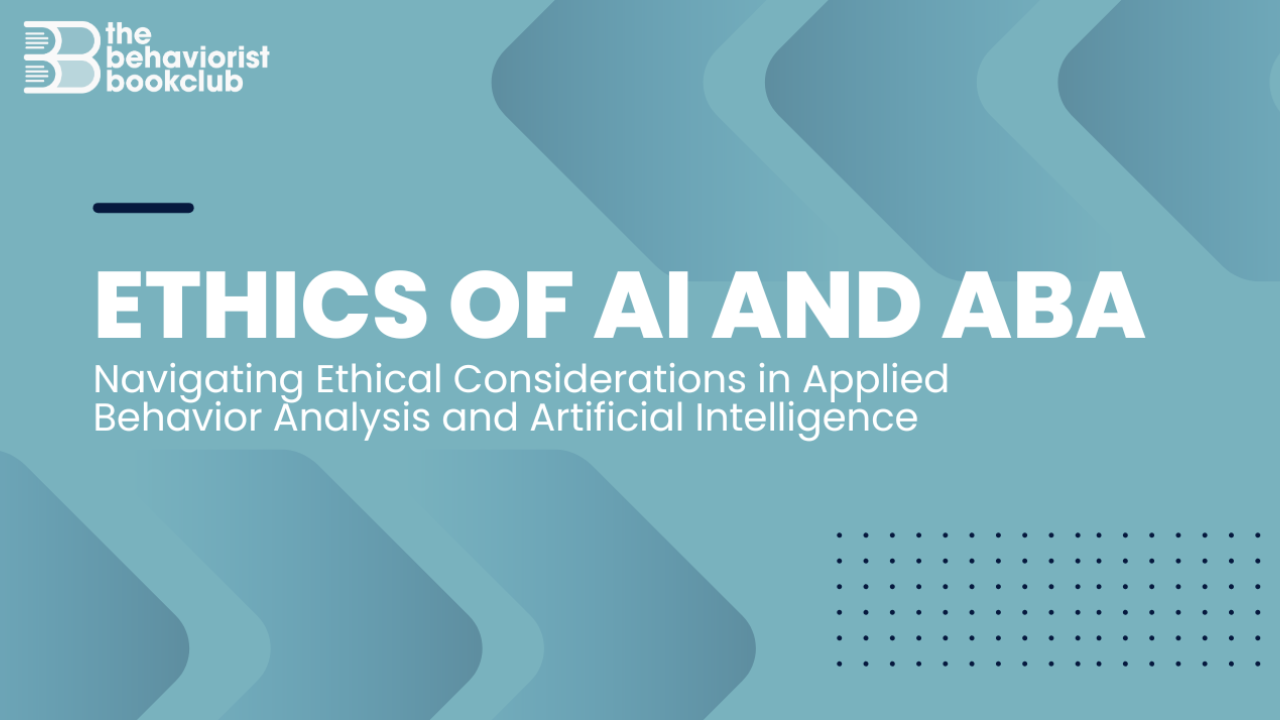Ethics of AI and ABA: Navigating Ethical Considerations in Applied Behavior Analysis and Artificial Intelligence
Mar 17, 2025
Ethics of AI and ABA: Navigating Ethical Considerations in Applied Behavior Analysis and Artificial Intelligence
What is Applied Behavior Analysis (ABA)?
Applied Behavior Analysis (ABA) is a scientifically validated approach focused on understanding and improving human behavior. Widely used in Autism Treatment, ABA uses behavior analytic research to modify behaviors and enhance patient outcomes. ABA practitioners, including Board-Certified Behavior Analysts (BCBAs), rely on systematic review and data-driven decisions to tailor intervention strategies.
Ethical Considerations in AI

As AI technologies continue to integrate into ABA service delivery, various ethical considerations emerge, raising concerns about privacy, bias, and employment displacement.
Data Privacy and Security
The ethical use of AI requires stringent data privacy protections, particularly concerning client information in ABA therapy. AI systems process volumes of data, making data security crucial to protecting sensitive data in compliance with the BACB Code of Ethics.
Bias and Fairness
Machine learning models rely on datasets that may contain biases. In the field of ABA, biased AI models could result in disparities in patient care, impacting individuals with autism spectrum disorder. Ethical AI development must ensure ethical principles of fairness and inclusivity.
Transparency and Accountability
For AI to be ethically integrated into ABA service delivery, there must be transparency regarding how AI is used, the sources of analytic literature, and its applicable ethical obligations. AI solutions should be explainable and auditable by professionals in Applied Behavioral Science.
Impact on Employment
While AI ethics offers automation in data collection and analysis, it also raises concerns about the representation of a client by AI-driven systems. ABA practitioners and behavior analytic practitioners must adapt to an ever-evolving use of technology while ensuring ethical oversight remains in human hands.
Ethical Considerations in ABA
The ethics rules governing ABA therapy ensure responsible intervention strategies while maintaining patient care and client dignity.
Informed Consent
Before integrating new technology, clients must consent to use Generative AI tools in therapy. This is by the Behavior Analyst Certification Board (BACB) Code of Ethics.
Client Dignity and Respect
Ethical ABA practices prioritize the rights, dignity, and respect of individuals receiving treatment. Ethical implications arise when AI-driven tools like facial recognition influence behavioral interventions.
Confidentiality
Maintaining client confidentiality is crucial in both ABA and AI applications. Tech companies and ABA committee professionals must enforce strict privacy policies in line with local bar association ethics committees.
Evidence-Based Practices
ABA relies on evidence-based practices supported by research studies. AI must be applied within an ethical framework to avoid unique ethical concerns associated with Generative Artificial Intelligence Tools.
The intersection of AI and ABA

How AI is Used in ABA
AI systems assist in data collection, behavior analysis, and treatment customization. These AI-driven tools support ABA practitioners by identifying behavioral trends and offering insights.
Benefits of AI in ABA
-
Improved patient outcomes through predictive analysis.
-
Automation of data analysis, reducing administrative burdens.
-
Enhanced ABA service delivery using AI-driven tools.
-
Real-time insights into client progress, improving treatment effectiveness.
Risks of AI in ABA
-
Potential ethical issues in misinterpreting behavior patterns.
-
Privacy concerns regarding the security of client information.
-
Over-reliance on AI solutions, diminishing human decision-making in therapy.
Case Studies and Real-World Examples
AI-Driven ABA Therapy Tools
Leading technology companies have developed AI solutions for ABA therapy, streamlining documentation and intervention plans.
Success Stories
AI ethics applications have reduced human intelligence errors, leading to more efficient therapy sessions and improved client engagement.
Ethical Dilemmas
Some AI-driven interventions may raise ethical rules and questions regarding bias, consent, and over-reliance on technology in ABA therapy.
Guidelines and Best Practices
Ethical Guidelines for AI Developers
Developers must adhere to future ethical guidelines established by organizations like the American Bar Association Standing Committee.
Ethical Guidelines for ABA Practitioners
ABA professionals should follow the ABA Model Rules and ensure that AI tools align with ethical standards and the practice of law in therapy applications.
Collaboration Between AI Experts and ABA Professionals
Cross-disciplinary partnerships between computer science specialists and ABA service providers can promote the ethical use of AI in behavior analysis.
Future Directions
Emerging Trends in AI and ABA
The integration of AI in ABA is expanding, with research on natural language processing, predictive analytics, and AI-driven patient monitoring.
Ongoing Ethical Challenges
Ongoing debates address legal ethics, ethical issues, and the use of GAI tools in behavioral science.
The Role of Regulation and Oversight
Regulatory bodies, such as the American Psychological Association and ABA practitioners, must meet applicable ethical obligations.
Conclusion
Summary of Key Points
The Ethics of AI and ABA involve balancing AI ethics with human-centered intervention strategies in Applied Behavior Analysis.
The Importance of Ethical Practices
Ethical practices in ABA therapy and AI technologies ensure equitable and effective treatment.
Solve your clinical challenges with research using this simple, 3 step process that saves you time and gets you clinical answers FAST.
Learn the Key Places Framework, the Research Finding Framework, and how they work together in this free minicourse.
Signing up will also subscribe you to the email list. Unsubscribe at anytime! We will never sell your information, for any reason.

